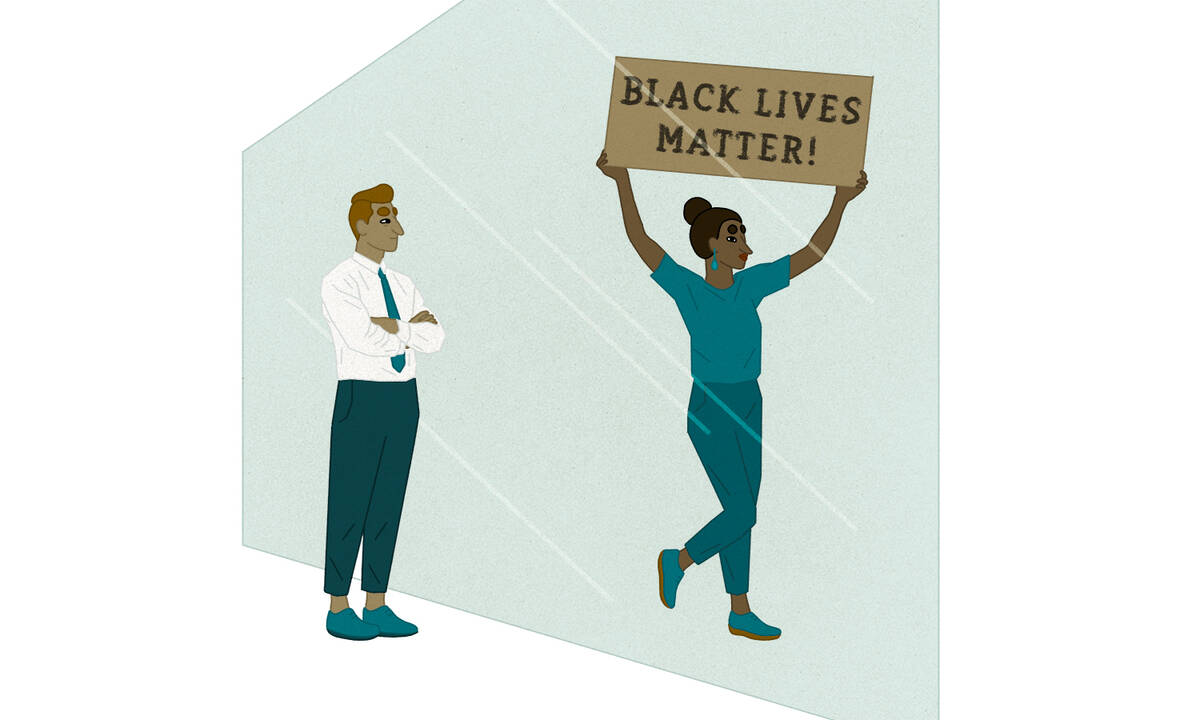Leadership Jul 20, 2020
Looking for “5 Quick Tips” to Build an Inclusive Organization? You’re on the Wrong Track.
Two experts discuss why corporate diversity initiatives so often fall short, and what it will take to produce real change.
This audio is powered by Spokn.

Lisa Röper
Editor’s note: This is part of a series of articles based on Kellogg Executive Education webinars focused on COVID-19.
Between the pandemic’s racial disparities in infection rates and outcomes and the widespread protests around police killings, 2020 has, for many, prompted another national reckoning on racism. This has led many organizations to look inward and focus on developing or improving their diversity, equity, and inclusion (DEI) efforts. Some have also ventured to consider a word that is new to many: antiracism.
Each Thursday, Kellogg faculty are offering free webinars on how COVID-19 is impacting businesses, markets, and careers. You can sign up for upcoming sessions, hosted by Kellogg Executive Education, here.
How can companies best tackle the important undertaking of scaled and integrated DEI strategies that are specific enough to identify and root out acts of racial inequity or their proponents? And how can this be done in ways that result in meaningful, long-term changes in their organizations and society?
These questions were the focus of a recent conversation between Nicholas Pearce, a clinical professor of management and organizations at Kellogg, and Xavier Ramey, CEO of Justice Informed, a social-impact consulting firm in Chicago. They spoke during a webinar from Kellogg Executive Education.
Below are lightly edited excerpts from their discussion.
On DEI Definitions
PEARCE: Diversity is not about marginality. Diversity is simply about human differences, whether they are based in our race, or gender, or sexual-orientation identities, whether it’s because we are parents, or not married, or veterans.
If we think about diversity as a seat at the table, inclusion is actually being able to be heard at the table. Your voice is not muted by virtue of the fact that your perspective is not cared about, that you don’t have access to the microphone.
RAMEY: Equity requires an honesty about our past and honesty about where we are today. If we actually get to equity, not only do I [as a Black man] get to speak, but I also am in an environment where we have a reorganized methodology for distribution of economic or human capital or other types of resources that allow for me to fully access and harness the fruits of my labor.
To be antiracist requires you look at how to stop racism as an action. Just saying I’m not a racist has never been enough to stop racism. It’s not about whether you’re nice or not. It’s about whether you’re effective. It’s the same thing for a business.
On COVID-19 and Corporate DEI Efforts
PEARCE: As COVID hit and companies had to make difficult choices, a lot of organizations either furloughed or released their chief diversity officer. Now some of these very same diversity professionals who were just deemed nonessential five minutes ago are uber essential and we can’t live without them.
RAMEY: It’s showed for whom it was an initiative versus a matter of sustainable infrastructure, for whom it was a “must have” and for whom it was a “nice to have.” Many of those who removed their infrastructure [when COVID-19 hit their bottom lines in March] were then immediately exposed [in June when DEI infrastructure was most needed] for how non-system wide their expertise was about DEI. It exposed that gap in prioritization.
And I’ve taken dozens and dozens of calls from organizations over the last six weeks, as they are scrambling to build infrastructure for something that has been a perennial issue in the hundreds-year history of the United States.
On Why There Are No Shortcuts for DEI Work
PEARCE: Many come to us looking for “the three bullet points” or “the five strategies.”
RAMEY: Yeah, [people think] “What are the quick wins?” What are the quick wins about an eternal issue!
We’re never going to get there until we deploy scaled resources that are commensurate with the scale of the problem. You are not going to engage DEI in your firm through having an MLK brunch every January, and a Black History Month event, and hanging a pride flag, or highlighting eight authors of Asian descent. You’re never going to get there with a training. Trainings only build understanding. They don’t build accountability.
The work that’s required for most organizations is actually to undergo a diversity, equity, and inclusion audit first. Much like going to the doctor, you don’t show up and tell the doctor, “I need surgery; cut me open.” There has to be a diagnosis. We have to go in, you’re going to have to open up your books, and we’re going to have to confront the data that we see and the narratives that we hear.
You can watch the full webinar here and see previous articles from this series here.
Emily Stone is the senior editor at Kellogg Insight.


